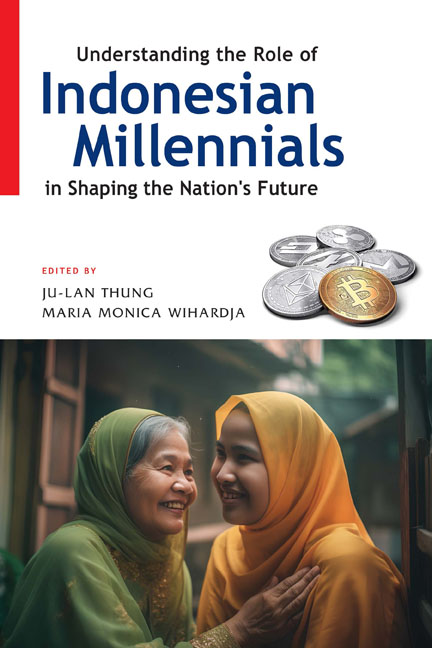Book contents
- Frontmatter
- Contents
- List of Figures
- List of Tables
- List of Annexes and Appendixes
- About the Contributors
- Introduction: Understanding the Role of Indonesian Millennials in Shaping a Nation’s Future
- 1 Generational Differences in Life Course Trajectories of Indonesians in Their Mid-twenties: Comparing Millennials and Older Cohorts
- 2 Millennials and Politics in Indonesia: 2019 and Beyond
- 3 Progressive Yet Powerless: The State of Indonesia’s Progressive Youth Organizations in the Post-Authoritarian Era
- 4 Indonesia’s Millennials and Gen Zs: Are They Financially (Il)literate?
- 5 Digital Competencies of the Millennial Generation in Micro, Small, and Medium Enterprises in West Bandung District
- 6 Millennial Muslims and “Haram Fatwas” on Cryptocurrency in Contemporary Indonesia
- 7 Youth and Religious Disaffiliation: A Study of Indonesian Millennials Learning Buddhism during Spiritual Disruption
- 8 Antagonism and Afterwards: Millennials in Indonesian Participatory Art after Reformasi
- 9 The NFT Phenomenon among Indonesia’s Millennial Artists
- Index
1 - Generational Differences in Life Course Trajectories of Indonesians in Their Mid-twenties: Comparing Millennials and Older Cohorts
Published online by Cambridge University Press: 13 April 2024
- Frontmatter
- Contents
- List of Figures
- List of Tables
- List of Annexes and Appendixes
- About the Contributors
- Introduction: Understanding the Role of Indonesian Millennials in Shaping a Nation’s Future
- 1 Generational Differences in Life Course Trajectories of Indonesians in Their Mid-twenties: Comparing Millennials and Older Cohorts
- 2 Millennials and Politics in Indonesia: 2019 and Beyond
- 3 Progressive Yet Powerless: The State of Indonesia’s Progressive Youth Organizations in the Post-Authoritarian Era
- 4 Indonesia’s Millennials and Gen Zs: Are They Financially (Il)literate?
- 5 Digital Competencies of the Millennial Generation in Micro, Small, and Medium Enterprises in West Bandung District
- 6 Millennial Muslims and “Haram Fatwas” on Cryptocurrency in Contemporary Indonesia
- 7 Youth and Religious Disaffiliation: A Study of Indonesian Millennials Learning Buddhism during Spiritual Disruption
- 8 Antagonism and Afterwards: Millennials in Indonesian Participatory Art after Reformasi
- 9 The NFT Phenomenon among Indonesia’s Millennial Artists
- Index
Summary
Life course events related to the transition to adulthood have been a critical part of social transformation within society. One's birth cohort or generation is argued to be one of the important determinants in explaining attitudes, beliefs and behaviours towards life course events. Therefore, to have a thorough understanding of the demographic behaviour of a society, it is important to examine generational differences in life course trajectories. Taking advantage of longitudinal information from the RAND Corporation's Indonesian Family Life Survey (IFLS), this study examines generational differences in the occurrence and timing of marital unions, labour market entry, and first adult migration of Indonesians. By using descriptive and regression analysis, this study compares whether the life course transitions experienced by Indonesians in their mid-twenties have changed between the current young adult generation, the millennials, and older cohorts, i.e., Generation X and baby boomers. The study found distinctive characteristics in the transition to adulthood for each generation. Moreover, remarkable variations in educational attainment across the generations have had critical effects on the demographic behaviour patterns of young Indonesians. The findings of this study can provide insights into societal changes in Indonesia and act as a basis for designing social policies to anticipate potential future trends.
INTRODUCTION
Life course transitions are an integral part of an individual's life cycle. People face various options at critical stages in their life trajectories. Their choices might be shaped by distinctive attitudes, beliefs and behaviours and create societal changes over time. Major life course events, such as getting married, entering the labour market and moving out from the parental home constitute critical phases of transition to adulthood and play important roles as markers for social transition and intergenerational change in a society (Berngruber and Bethmann 2022).
An individual's birth cohort or generation may act as an important determinant of the shifts in the patterns of transition to adulthood. Birth cohorts reflect structural changes over time in a country, including changes in the governmental system and economic development (Vidal and Lutz 2018). Therefore, cohort effect explains how each generation has different behaviours due to variations in the temporal situations they experience. However, birth cohorts may not be sufficient to explain changes in people's behaviours over time. Variations in people's attitudes and behaviours can also be influenced by period and life course effects (Duffy 2021).
- Type
- Chapter
- Information
- Publisher: ISEAS–Yusof Ishak InstitutePrint publication year: 2024

